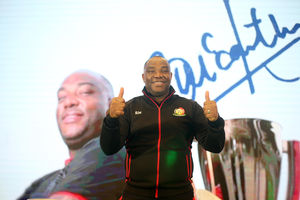
New Harambee Stars coach Benni McCarthy (right) and Harambee Starlets coach Beldine Odemba during his unveiling in Nairobi on March 3, 2025.
Uncertainty continues to surround the salary payment of new Harambee Stars coach Benni McCarthy, with the Salaries and Remuneration Commission (SRC) stating that the matter does not fall within its mandate.
McCarthy's salary, along with that of his three backroom staff, remains undisclosed, as the Football Kenya Federation (FKF) has yet to reveal their monthly earnings.
The former Manchester United forwards coach and ex-South Africa international was unveiled as Harambee Stars head coach on March 3 on a two-year contract.
At United, he was earning about Sh6.6 million per week, according to a South African website inquiresalary.co.za, which translated to Sh26.4 million per month.

Benni McCarthy (center) during training session with Manchester United's first team at Aon Training Complex, Manchester on February 22, 2023.
He will be assisted by fellow South Africans Vasili Manousakis (assistant coach), Moeneeb Joseph (goalkeeper trainer), and Pilela Maposa (performance analyst).
FKF has dismissed speculation that McCarthy is earning a monthly salary of Sh8 million. FKF CEO Harold Ndege, currently attending the 14th Confederation of African Football (Caf) Extraordinary General Assembly in Cairo, Egypt, maintained that the federation has already shared the coach’s contract with the government for payment processing.
“I already gave you an interview regarding this,” said Ndege, declining to comment further.
Last week, FKF Head of Communications Jeff Kinyanjui stated on X (formerly Twitter) that McCarthy’s salary is government-funded under SRC guidelines.

Former Harambee Stars coach Francis Kimanzi (right) with new Harambee Stars head coach Benni McCarthy and goalkeepers trainer Moeneeb Josephs in Nairobi on March 3, 2025.
“The coach’s salary is paid by the government and falls under the Salaries and Remuneration Commission (SRC) guidelines. Even the entire technical bench does not earn such an amount collectively,” posted Kinyanjui.
However, SRC refuted any involvement in McCarthy’s payment. A source at the commission, speaking on condition of anonymity, clarified that such an arrangement would only exist between the Ministry of Sports and FKF, as SRC does not process salaries for national team coaches or classify them as civil servants.
“I have consulted, and there is no such issue. SRC has never had an arrangement to pay national team coaches as civil servants. If this were done for Harambee Stars, other federations would also demand the same,” said the source.
“If McCarthy is being paid, it could only be through FKF or an arrangement with the Ministry of Sports, but not through SRC. This issue does not fall under our guidelines.”
Attempts to get clarification from Sports Principal Secretary Peter Tum have been unsuccessful, as he has not responded to calls. An official referred to by this writer promised to follow up with Tum and provide full details but has since gone silent.

Benni McCarthy when he was coach of South African side AmaZulu.
The lack of transparency is reminiscent of past salary disputes involving former Harambee Stars coaches.
Last year, former Sports Cabinet Secretary Ababu Namwamba criticised FKF for hiring Turkish coach Engin Firat in an unprocedural manner and pressuring the government to pay his salary despite keeping his contract secret.
Namwamba insisted at the time that the government could not foot Firat’s salary, as it was not involved in his appointment.
Similarly, ex-Sports CS Kipchumba Murkomen (now Interior CS) stated publicly that it was not the government’s responsibility to pay a national team coach, emphasising that the duty lay solely with FKF.
Whether McCarthy’s salary will be paid by the government—and the exact amount—remains unclear.
Kenya has a history of costly legal battles with unpaid coaches, including Algerian Adel Amrouche, who was awarded Sh110 million in August 2021 after taking FKF to Fifa over unpaid wages.






